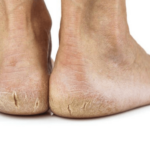The other day, I was doing some work on my computer, and I had a nagging itch on my foot. I scratched the itch, and it felt so great. It led me to think I should discuss why scratching the itch felt so good. So, why does it feel so good to scratch my feet?
It feels good to scratch your feet or any part of your skin because it triggers a chemical response. Scratching triggers mild pain in your skin, and nerve cells tell your brain to release the pain-fighting chemical serotonin. A release of serotonin in your brain makes you feel happier, a brief high.
Some say that an itch is a form of small pain. An itch is technically called, pruritus which scientists believe to be the body’s way to protect the skin and large organs from parasites and dead skin build-up.
Our skin can be seen as our body’s first line of defense against parasites and bacteria. Unlike our large organs protected by our immune system, the skin has to defend itself from constant contact with the outside world.
We have a universal response to itch because it causes low pain signals to our brains which in turn provides relief. When you scratch an itch, specific cells advise your brain to send a chemical response. Serotonin is responsible for that moment of relief you feel as soon as you start scratching your itch.
Read on to learn more about why it feels so good to scratch your feet and how you can avoid itching, scratching, and damaging your skin.
Why Does It Feel so Good to Scratch My Feet?
The medical term for itchiness is pruritus, which is caused by an irritating sensation on your skin. This sensation can occur anywhere on your body, but some more than others.
Your feet are prone to itchiness or pruritus because it is constantly exposed to conditions for a prolonged period of time. Itchy feet is normally nothing to concern yourself with; however, it may be a symptom of an underlying skin condition.
So why does it feel so good to scratch my feet? As mentioned earlier, when you scratch an itch, your body releases serotonin into the brain, which gives you a brief moment of pleasure. The serotonin is meant to offset the minor pain of the itch.
The problem with continued scratching is that often, after you finish scratching and the feel-good serotonin dies down, the itch comes back, possibly even stronger! This can be visualized as a train going so fast around a corner, and it jumps the tracks.
The release of serotonin gives pleasure and feels so good, but it jumps the tracks leading to more and often worse itching. This is also referred to as the vicious itch-scratch cycle.
The below video sums up nicely why it feels so darn good to scratch an itch:
Itchy Feet and Skin Conditions
Itchy feet are commonly due to situations that expose your feet for a period of time. Though some situations are normal, prolonged exposure tends to breed parasites and fungi.
Conditions such as:
- High moisture
- Irritants when you walk barefoot
- Infectious bacteria
- Dry environments
These conditions often give bacteria room to grow and breed which then leads to skin conditions. There are a number of diseases, skin conditions, and irritants that can cause itchy feet.
Diseases
There are several medical conditions that can cause the itchiness of your feet due to the increase of your body’s production of the neurotransmitter serotonin. Diseases such as liver disease, cancer, kidney disease, cholestasis, and peripheral neuropathy often cause itchy feet.
Despite these diseases being the cause for your itchy feet are less common, they should not be ignored.
Skin Conditions
A more common cause of itchy feet is skin conditions. When suffering from pruritus for a lengthy period of time, it’s common for people to think it is an allergic reaction to something. It is a common idea, and you are not alone. The itchiness of your feet is almost always due to your body trying to prevent any bacteria or parasite from taking over. As a natural defense, we scratch.
An example of a common skin condition is allergic contact dermatitis. Though there are three types of contact dermatitis, this strain develops when you are exposed to foreign substances. The body then releases inflammatory chemicals that make your feet itchy and irritated.
They are often caused by:
- Laundry detergent,
- Jewelry made from nickel and gold,
- Chemical cosmetics or skincare products,
- Latex, and
- Irritating, scratchy fabrics (used for socks or bedding) such as polyester or wool.
Athlete’s Foot or tinea pedis is a common infectious fungal infection that affects the skin on your feet. It sometimes spreads to your toenails and hands. Though it isn’t a serious skin condition, it can be difficult to cure, especially if you are suffering from diabetes or have a weaker immune system.
You can catch the fungus when you have direct contact with someone who is infected or touching a contaminated surface. The fungus thrives and breeds in moist and warm environments.
You are at risk of having athlete’s foot if you:
- Keep your feet wet for a long time
- Wear tight closed shoes all the time
- Have sweaty feet
- Share socks, shoes, or towels with someone who has athlete’s foot
- If you have a nail injury or minor skin problems on your foot
Psoriasis is an autoimmune condition that results in your skin cells building up. The inflammation and redness of these scales cause itchiness. If you have psoriasis, your skin cells develop too quickly that they don’t have time to fall off and cause the buildup.
These scales normally develop on your:
- Hands
- Feet
- Neck
- Scalp
- Face
An autoimmune disease is when your body attacks itself. With psoriasis, your white blood cells mistakenly attack your skin cells. People who suffer from Type-II Diabetes, inflammatory bowel disease, heart disease, and anxiety are more prone to developing psoriasis.
Exposure to Irritants
Substances that cause a reaction from your body can be classified as an irritant. There are various medications and topical ointments that you can use to treat the itchiness right away. However, these irritants can also be prescribed medications. Opioids or narcotics can also cause your feet to itch.
See the below video for some great insight into what causes itchy feet and how to prevent them from itching:
Symptoms of Itchy Feet
When you scratch your feet, your skin will change and accompany the itchiness.
Examples of these skin changes are:
- Cracked heels
- Dry and scaly plaques
- Rash
- Blisters
- Redness
- Swelling
There are also cases where there are no physical skin changes when your feet itch.
Itchy Feet Treatments
Depending on what caused your feet to itch, your doctor will prescribe medication, sprays, or creams to address the irritations. As a general rule, if your skin condition is brought about by an allergy, you should avoid the product altogether.
Treatments to relieve the itchiness of feet include:
- Diphenhydramine (Benadryl) is an antihistamine that can help relieve your skin of the itchiness. Antihistamines are also a form of sedative. That’s why they should be taken in the proper dosage prescribed by your doctor.
- Those that suffer from athlete’s foot, an antifungal spray or cream may help. For a more severe chronic fungal infection, an antifungal cream will be prescribed by your physician.
- For some, topical anti-itch medication and steroid creams may help reduce itching of the skin.
Preventing Itchy Feet
Prevention is always better than cure. To prevent yourself from getting irritated, itchy feet, always take good care of your feet. By practicing good foot care, you can reduce the likeliness of having itchy feet and prevent some causes such as fungal infections.
- Wait for your feet to completely dry off before putting on socks and shoes.
- Always use a mild soap when showering or bathing, especially your feet. Pay extra close attention to the areas between your toes and moisturize.
- Make it a habit to wear cotton socks because they are not irritating and allow your feet to breathe more.
- Try to wear well-ventilated shoes more often. Shoes that have holes or mesh cloths allow your feet to stay dry.
Conclusion – Why Does It Feel so Good to Scratch My Feet?
So why does it feel so good to scratch my feet? It feels so good to scratch your feet because your brain releases serotonin when you scratch. Serotonin is a “happy feeling” chemical that is released to offset the minor pain of scratching.
Itchiness of any form should never be taken lightly. It could be a sign of a more serious issue that needs to be addressed.
With proper foot hygiene, you should be able to avoid any serious infections or skin conditions. Repeated itchiness of your feet for a prolonged period of time should be a sign for you to speak with your physician.
Your doctor might ask you for your medical history and conduct a physical examination of your itchy feet. They might ask you for any new prescriptions you might be taking that may cause the itchiness of your feet, if you have been exposed to any potential irritants, and if any of your family or friends have skin-related concerns.
Remember to keep your feet clean and dry to prevent any bacteria from breeding and causing skin conditions.
Make sure that you avoid prolonged exposure to these conditions. Also, remember to always practice good foot hygiene by doing the following:
Serotonin might sound like a good thing since it’s the body’s way of coping with pain and itches, but too much of it is not good for you. Plus, often, the scratch of the itch leads to more itching. This is a vicious itch-scratch cycle that can cause damage to the skin on your feet or wherever you scratch.
Related reading:
Bruise Itches [Causes and Treatments for an Itchy Bruise]
Birth Control Itchy Skin – Causes and Treatments
Itchy Soles of Feet at Night – Causes and Remedies
Bottom of Your Feet Itchy Meaning – Medical and Superstition





